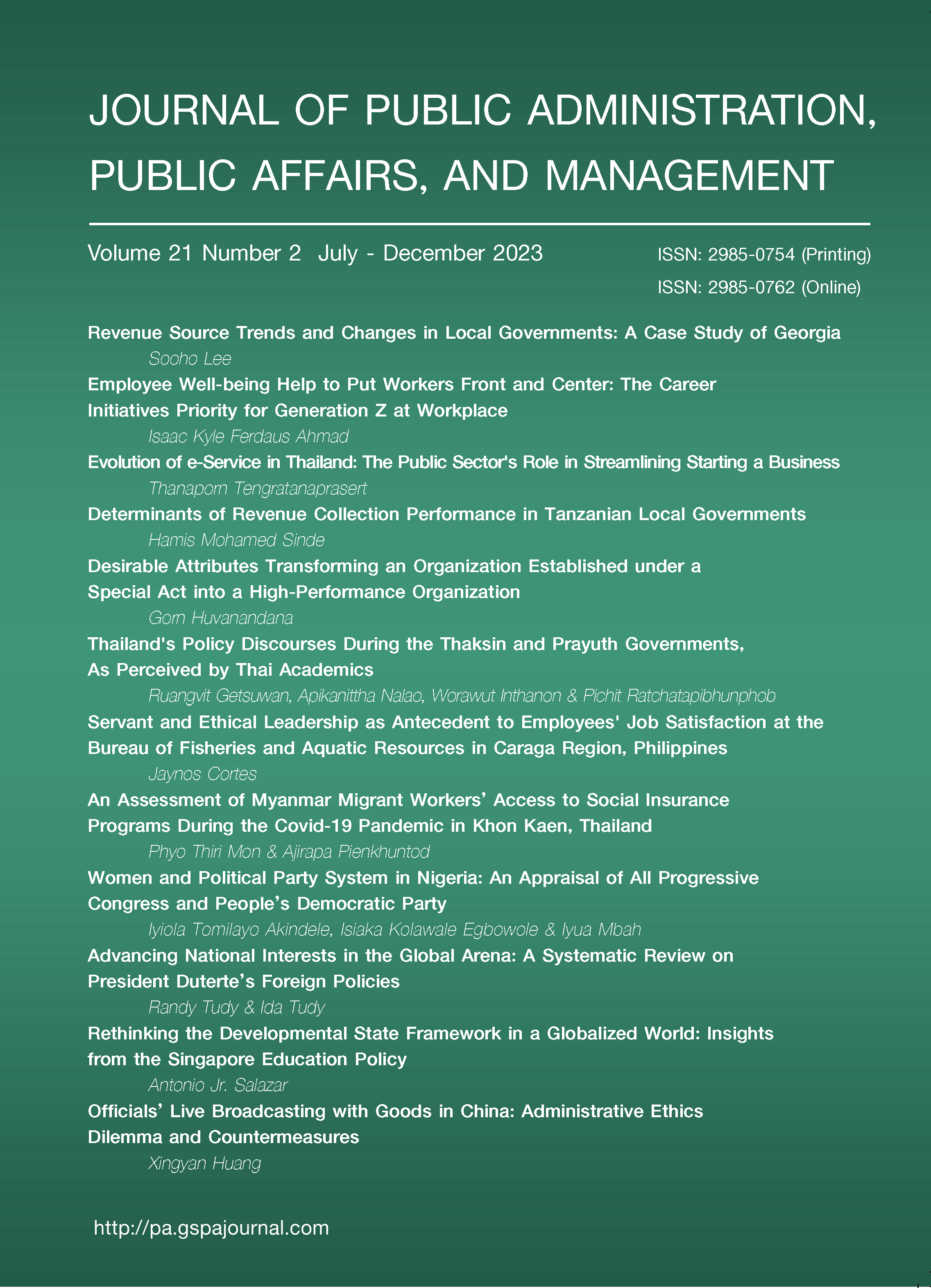Thailand's Policy Discourses during the Thaksin and Prayuth Governments, as Perceived by Thai Academics
Keywords:
Thailand, populism discourse, civil society as policy discourseAbstract
This study aims to compare and contrast the policy discourses of Thailand's Thaksin and Prayuth regimes in terms of perceptions, social impacts, and preferences. The rationale for the study is that Thaksin's populism and Prayuth's civil society policies have intriguing policy shifts, continuity, and a distinctive discourse policy personality. Researchers could use poststructuralist discourse theory and critical policy analysis as a post-positivist approach to compare and study the diverse discourse set. Thirty academics from six Thai universities were interviewed for this project, and their utterances were used to analyze and interpret the discursive power of the two policy approaches. Another rationale that researchers about populist policy in developing countries in the past, especially Baykan, Gürsoy and Ostiguy (2021), said that the populist change in Thailand, Venezuela, and Turkey didn't work. Still, the populist program might have survived due to its much more dominant power. This addition tries to back that up. How did this happen, and what caused it? The study shows that Prayuth's policies on civil society could not fully replace the popular programs of the Thaksin government. Civil society was one of the most critical factors in replacement failure. The first only appears in the name; it doesn't appear in their implementation. The second reason is that the Prayuth government didn't think that appealing to the people would work as a populist strategy. Surprisingly, they didn't make poor people in rural areas the goal of their policies or try to change how ordinary people asked to give themselves power in policies.
References
Atudhya, A. K. N, & Urabunnualchat, M. (2020). Pracharat discourse In Thailand political context. Journal of Public Administration and Politics, 9(1), 44-63.
Baykan, T. S., Gürsoy, S. & Ostiguy, P. (2021). Anti-populist coups d’état in the twenty-first century: Reason, dynamics, and consequences. Third World Quarterly, 42(4), 793-811. doi:10.1080/01436595.2020.1871329.
Bezverkha, A. (2015). Representations of the Crimean Tatars in the Ukrainian Media Discourse. Unpublished doctoral dissertation, National University of Kyiv-Mohyla Academy, Kyiv, Ukraine.
Birdsall, N. & Haggard, S. (2000). After the Crisis: The Social Contract and the Middle Class in East Asia. Washington, DC: Carnegie Endowment for International Peace.
Blommaert, J. (2005). Discourses: A Critical Introduction. Cambridge: Cambridge University Press.
Bun-Mee, T. (2004). Pra-Cha-Sunk-Khom (Civil Society). Thailand: Sai Than Publisher.
Carter, R. (1993). Introducing Applied Linguistics: An A-Z Guide. New York: Penguin Group USA.
Dror, Y. (2002). The Capacity to Govern, a Report to the Club of Rome. London: Frank Cass.
Dryzek, J. S., & Dunleavy, P. (2009). Theories of the Democratic State. Basingstoke: Palgrave Macmillan.
Elliott, C. M. (2003). Civil society and democracy. In Elliott, C. M. (Ed.). Civil Society and Democracy, a Reader. Oxford: Oxford University Press.
Giddens, A. (1998, May 1). After the left's paralysis. New Statesman, 18-21.
Henry, N. (2010). Public Administration and Public Affairs. 11th ed. New Jersey: Prentice-Hall.
Hewison, K. (2001). Nationalism, populism, dependency: Southeast Asia and responses to the Asian crisis. Singapore Journal of Tropical Geography, 22(3), 219-236.
Hewison, K. (2007). Thailand after the "good" coup. Brown Journal of World Affairs, 14(1), 237-247.
Howarth, D., & Griggs, S. (2015). Poststructuralist discourse theory and critical policy studies: Interests, identities and policy change. In Fischer, F., Torgerson, D., Durnova, A., & Orsini, M. (Eds.). Handbook of Critical Policy Studies. Cheltenham: Edward Elgar Publishing.
Kesanuch S., Duangkhunpet, T., Phuttajorn, A., Phosing, P., & Kenaphoom, S. (2017). Analysis of state policy of "populism" to "civil state" similarities and differences from Thai government's direction [Special issue]. Dhammathas Academic Journal, 17(3), 361-375.
Laclau, E. (2005). Populism: What's in a name? In Pannizza, F. (Ed.). Populism and the Mirror of Democracy. New York: Verso.
Laothamatas, A. (2006). Thaksina-Pra-Cha-Ni-Yom. Bangkok: King Prajadhipok's Institute.
Lasote, P. (2020). Populism and Greek political crisis. Journal of European Studies, 26(2), 84-105.
Markou G., & Lasote, P. (2015). Populism in Asia: The case of Thaksin in Thailand. Paper presented at the International Conference on 'Populism and Democracy', Thessaloniki, Greece.
Matijasevich, D. (2018). Populist hangover lessons from Southeast Asia. Asian Journal of Comparative Politics, 5(1), 1-17.
McArthur, M. (1996). The Oxford Companion to the English Language. Oxford: Oxford University Press.
Miscoiu, S. (2008). Discourse theory and political contestation, an inquiry based on an international research project. In Miscoiu, S., Craciun, O. R., & Colopelnic, N. (Eds.). Radicalism, Populism, Interventionism, Three Approaches Based on Discourse Theory. Cluj-Napoca, Romania: The Publishing House of the Foundation for European Studies.
Panizza, F. (2005). Introduction, populism and the mirror of democracy. In Pannizza, F. (Ed.). Populism and the Mirror of Democracy. New York: Verso.
Phongpaichit, P., & Baker, C. (2001). Thailand's Thaksin: New Populism or Old Cronyism. New York: Columbia University.
Roberts, K. (2003). Populism and Democracy in Latin America. Retrieved from http://www.ciaonet.org/conf/car30g.pdf.
Savski, S. (2016). State language policy in time and space: Meaning, transformation, recontextualization. In Barakos E., & Unger, J. (Eds.). Discursive Approaches to Language Policy. London: Palgrave MacMillan.
ThaiPublica. (2016). 20 Years, from Thaksin Shinawatra to Prayut Chan-o-cha, Used a “Central Budget” of 5 Trillion, 14.5% of the Total Budget. Retrieved from https://thaipublica.org/2016/11/thaksin-to-prayuth-budgeting/.
ThaiPublica. (2021). Agenda (Secret) Cabinet Passes Emergency Decree to Borrow another 700 Billion, Fearing the State will Collapse. “Former Finance Minister” Points Out VAT Increase to Pay Off Debt. Retrieved from https://thaipublica.org/2021/05/public-debt-with-borrow-7-hundred-billion-baht/.
Torfing, J. (2005). Discourse theory: Achievements, arguments, and challenges, In Howarth, D., & Torfing, J. (Eds.). Discourse Theory in European Politics. London: Palgrave Macmillan.
Ziai, A. (2016). Development Discourse and Global History, from Colonialism to the Sustainable Development Goals. Oxfordshire: Routledge.
Downloads
Published
How to Cite
Issue
Section
License

This work is licensed under a Creative Commons Attribution-NonCommercial-NoDerivatives 4.0 International License.



